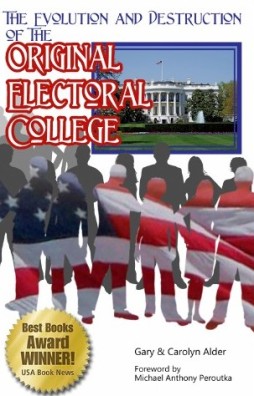The Framers intelligently designed The United States of America to be a complex constitutional representative Republic not a Democracy.
Key 12 Analysis
When the constitutional convention ended a lady asked Benjamin Franklin, “What kind of government have you given us?” to which he replied “A republic Madam, if you can keep it.” Benjamin Franklin after convention.
In a complex constitutional representative Republic, people elect people to represent them on several levels. Rights are protected. The representatives are expected to look out for the best interests of all of their constituents; men, women, children, minorities, rich, poor, etc. The representatives are limited in their prerogatives because their powers are restricted by a written constitution and therefore they govern by law, not by the whims of men.
In the original Constitution, the only national office elected by the people, was their representative to the U.S. House of Representatives. The Senators were chosen by the state legislatures to represent the interests of the various states. What is really foreign to most people is the method that the Framers designed for the election of the chief executive of the United States. He was to be the President of the union of States, not the president of the people. The method of selecting this position is a perfect example of a complex constitutional representative Republic. Each state was to appoint a number of electors equal to their representation in Congress. These electors would meet on the same day in their respective states and write down the names of two choices for President. These lists from each state were signed, certified, sealed, and sent to the President of the Senate. All of the official certificates were opened and counted in the presence of both the House and the Senate. The process of counting the electoral votes or nominations created a field of candidates consisting of the five individuals who received the highest number of electoral votes. From these candidates the House of Representatives was to make the selection of a President. In the election that took place in the House of Representatives, each state had one vote. The balloting was to continue until a majority of the states elected a president. There was one exception to the States making the final choice for President. If a majority of the electors had nominated the person with the highest number of votes, then that individual was declared to be the President. Since each elector made two nominations there could be a two or three way tie. In this case the field of candidates was limited to the tied individuals. After the selection of the president, the person with the highest number of electoral votes of the remaining candidates would be the vice president.
Our Framers designed this brilliant system to select a president of the states. In the constitutional convention, they discussed it numerous times, at great length, and finally after 60 ballots resolved how to fill the office of the Chief Executive. The method was so skillfully designed that even those who were opposed to the ratification of the Constitution did not oppose this method of selecting a President of the United States. This was explained by Alexander Hamilton in Federalist Paper #68.
Today the process of electing a President has been so disgraced by campaigning and party politics and the farce we have made of the Electoral College system, is so foreign to the design of the Framers, that it is not even recognizable. The Framers plan could be described as, “Wise men nominating wise men.”
Quotes
Remember democracy never lasts long. It soon wastes, exhausts, and murders itself. There never was a democracy yet that did not commit suicide. John Adams, letter to John Taylor, April 15, 1814
* * *
That, as a republic is the best of governments, so that particular arrangements of the powers of society, or, in other words, that form of government which is best contrived to secure an impartial and exact execution of the laws, is the best of republics. John Adams, Thoughts on Government, 1776
* * *
[D]emocracies have ever been spectacles of turbulence and contention; have ever been found incompatible with personal security, or the rights of property; and have, in general, been as short in their lives as they have been violent in their deaths.
James Madison, Federalist No. 10, November 23, 1787
* * *
The power under the Constitution will always be in the people. It is entrusted for certain defined purposes, for a certain limited period, to representatives of their own choosing; and whenever it is executed contrary to their interest, or not agreeable to their wishes, their servants can, and undoubtedly will, be recalled. George Washington 1787
* * *
“A democracy cannot exist as a permanent form of government. It can only exist until the voters discover that they can vote themselves money from the public treasure. From that moment on the majority always votes for the candidates promising the most money from the public treasury, with the result that a democracy always collapses over loose fiscal policy followed by a dictatorship. The average age of the world’s great civilizations has been two hundred years. These nations have progressed through the following sequence: from bondage to spiritual faith, from spiritual faith to great courage, from courage to liberty, from liberty to abundance, from abundance to selfishness, from selfishness to complacency, from complacency to apathy, from apathy to dependency, from dependency back to bondage.” Alexander Tyler 1897(A Scottish professor)
* * *


